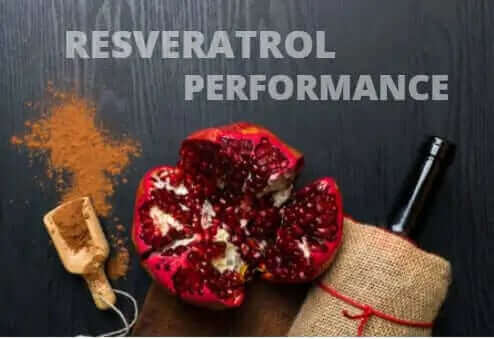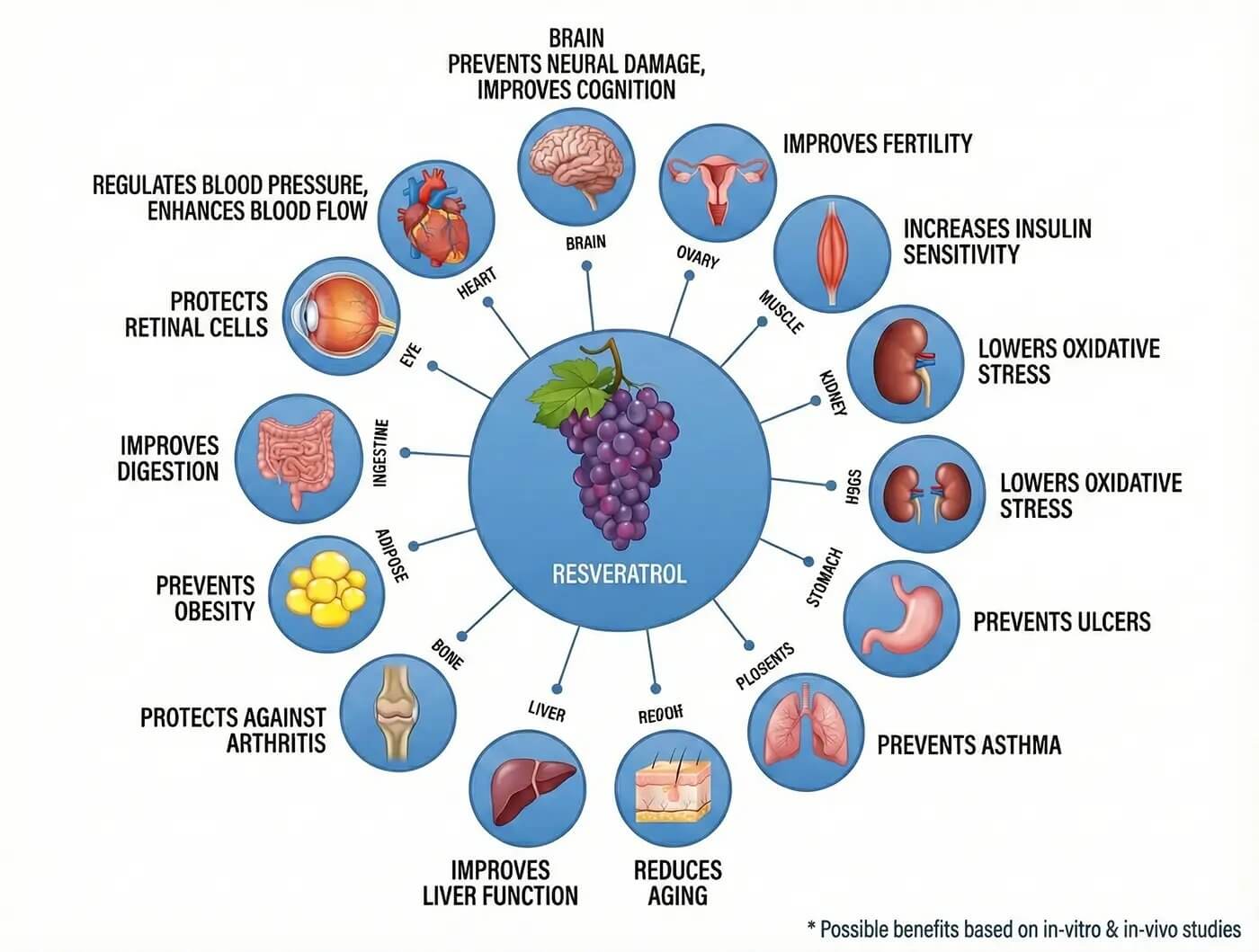Resveratrol Performance Benefits: How This Powerful Antioxidant Enhances Exercise Results and Athletic Recovery
Resveratrol has emerged as a game-changing supplement for athletes and fitness enthusiasts seeking to maximize their workout performance and recovery. This powerful antioxidant compound, found naturally in red grapes and berries, offers remarkable benefits when combined with regular exercise routines. Recent scientific studies reveal that resveratrol supplementation not only reduces exercise-induced cellular stress but also dramatically increases mitochondrial production, leading to enhanced energy and endurance.
Understanding Resveratrol and Exercise Performance
When we exercise or consume food, our cells work hard to extract nutrients and generate energy. This metabolic process, while essential for life, creates unwanted toxic compounds as byproducts. Our bodies naturally produce proteins to eliminate these toxins, but supplementing with resveratrol provides additional support for this crucial detoxification process.
The relationship between resveratrol and athletic performance becomes particularly fascinating when we examine how our cells respond to exercise stress. During intense physical activity, our muscles demand more energy, leading to increased production of oxygen-based radicals and inflammatory compounds. This is where resveratrol's antioxidant properties shine, offering protection against these potentially harmful substances while supporting optimal cellular function.
Groundbreaking Research on Resveratrol Performance Enhancement
Study 1: Resveratrol and Quercetin Reduce Exercise-Induced Stress
A pivotal study published in Applied Physiology, Nutrition, and Metabolism (March 8, 2013) investigated how resveratrol combined with quercetin affects exercise-induced oxidative stress. The research team divided athletes into two groups: one received a resveratrol-quercetin supplement, while the other received a placebo.
Blood samples collected before and after exercise revealed exciting results. Athletes who took the resveratrol combination showed significantly lower levels of toxic byproducts compared to the placebo group. This finding suggests that resveratrol supplementation can help athletes train harder while experiencing less cellular damage, potentially leading to:
- Faster recovery times between workouts
- Reduced muscle soreness and fatigue
- Improved overall athletic performance
- Better long-term health outcomes for regular exercisers
Study 2: Resveratrol Boosts Mitochondrial Production
Perhaps even more impressive are the findings from The Journal of Biological Chemistry (2013), which explored how resveratrol affects mitochondrial biogenesis. Mitochondria, often called the powerhouses of cells, generate the energy needed for all cellular activities. More mitochondria mean more energy production capacity, translating directly to improved athletic performance.
The study revealed that while exercise alone increases mitochondrial numbers moderately, and resveratrol alone produces modest gains, the combination creates an exponential effect. This synergistic relationship means athletes taking resveratrol while maintaining regular exercise routines experience dramatically enhanced mitochondrial production compared to either intervention alone.
The Science Behind Resveratrol's Performance Benefits
Resveratrol works its magic through activation of sirtuins, particularly sirtuin-1 (SIRT1). These proteins play crucial roles in cellular health, longevity, and metabolic regulation. When resveratrol activates SIRT1, it triggers a cascade of beneficial effects:
- Enhanced Energy Production: Increased mitochondrial biogenesis means more cellular powerhouses generating ATP (the body's energy currency)
- Improved Oxygen Utilization: Better mitochondrial function leads to more efficient oxygen use during exercise
- Reduced Inflammation: Resveratrol's anti-inflammatory properties help minimize exercise-induced inflammation
- Accelerated Recovery: Lower oxidative stress means faster muscle repair and regeneration
- Increased Endurance: More mitochondria and better energy efficiency translate to improved stamina
Practical Applications for Athletes and Fitness Enthusiasts
Understanding how resveratrol enhances performance opens exciting possibilities for anyone looking to optimize their fitness journey. Whether you're a competitive athlete, weekend warrior, or someone just beginning an exercise program, resveratrol supplementation offers tangible benefits that can help you reach your goals faster and more comfortably.
Optimal Timing for Resveratrol Supplementation
Research suggests taking resveratrol before exercise maximizes its protective effects against oxidative stress. Many athletes find success with the following protocol:
- Take resveratrol 30-60 minutes before workout sessions
- Maintain consistent daily supplementation for cumulative benefits
- Consider combining with quercetin for enhanced effects
- Stay hydrated to support optimal absorption and cellular function
Choosing the Right Resveratrol Supplement
Not all resveratrol supplements deliver equal results. The key factor determining effectiveness is bioavailability - how well your body can absorb and utilize the compound. Standard resveratrol supplements often suffer from poor absorption rates, limiting their potential benefits.
Micronized resveratrol represents a breakthrough in supplement technology. By reducing particle size to microscopic levels, micronization dramatically improves absorption rates. Products like Nitro250 utilize this advanced technology to deliver up to 5 times better absorption compared to regular resveratrol supplements, ensuring you receive maximum benefits from every dose.
Real-World Success Stories
Athletes across various disciplines report remarkable improvements after incorporating resveratrol into their training regimens. Marathon runners notice enhanced endurance and faster recovery between long runs. Weightlifters experience reduced muscle soreness and improved strength gains. Even casual fitness enthusiasts find they can exercise more frequently without experiencing burnout or excessive fatigue.
These success stories align perfectly with the scientific research, demonstrating that resveratrol's benefits extend beyond laboratory settings into real-world athletic performance. The combination of reduced oxidative stress, increased mitochondrial production, and enhanced cellular energy creates a powerful foundation for achieving fitness goals.
Beyond Performance: Long-Term Health Benefits
While the immediate performance benefits of resveratrol are compelling, the long-term health advantages make it an even more valuable addition to any fitness routine. Regular resveratrol supplementation combined with exercise may contribute to:
- Healthier cardiovascular function
- Improved insulin sensitivity
- Better cognitive performance
- Enhanced immune system function
- Potential anti-aging effects at the cellular level
These benefits create a positive feedback loop: better health enables more consistent exercise, which amplifies resveratrol's effects, leading to even greater improvements in both performance and wellbeing.
Making Resveratrol Part of Your Fitness Journey
Incorporating resveratrol into your exercise routine represents a smart investment in both immediate performance gains and long-term health. The scientific evidence clearly demonstrates that this powerful antioxidant works synergistically with exercise to create results greater than either could achieve alone.
Start by selecting a high-quality, bioavailable resveratrol supplement. Look for micronized formulations that ensure optimal absorption. Establish a consistent supplementation routine, taking your resveratrol before workouts and maintaining daily doses even on rest days. Monitor your progress, noting improvements in endurance, recovery time, and overall energy levels.
Remember that resveratrol supplementation works best as part of a comprehensive approach to fitness and health. Combine it with regular exercise, proper nutrition, adequate sleep, and stress management for optimal results. The synergistic effects of these lifestyle factors, enhanced by resveratrol's cellular benefits, create the perfect environment for achieving your fitness goals.
The Future of Athletic Performance Enhancement
As research continues to unveil the mechanisms behind resveratrol's performance benefits, we can expect even more targeted applications for athletes. Scientists are exploring optimal dosing strategies, timing protocols, and combinations with other natural compounds to maximize results. The future looks bright for those seeking safe, natural ways to enhance athletic performance and recovery.
The evidence is clear: resveratrol offers a scientifically-backed approach to improving exercise performance while protecting your body from the stress of intense physical activity. Whether your goal is running faster, lifting heavier, or simply feeling better during and after workouts, resveratrol supplementation provides the cellular support needed to reach new heights in your fitness journey.
Frequently Asked Questions About Resveratrol and Exercise Performance
What is the best time to take resveratrol for exercise performance?
For optimal exercise performance benefits, take resveratrol 30-60 minutes before your workout. This timing allows the compound to reach peak levels in your bloodstream when you need it most. Additionally, maintaining consistent daily supplementation, even on rest days, helps build up beneficial levels in your system for sustained performance improvements.
How does resveratrol improve athletic endurance?
Resveratrol enhances endurance through multiple mechanisms. It increases mitochondrial production, giving your cells more energy-generating capacity. It also reduces exercise-induced oxidative stress, allowing you to train harder with less cellular damage. The activation of SIRT1 proteins improves oxygen utilization and metabolic efficiency, translating to better stamina and longer-lasting energy during workouts.
Can resveratrol help with post-workout recovery?
Yes, resveratrol significantly aids post-workout recovery. By reducing inflammatory markers and oxidative stress caused by intense exercise, it helps minimize muscle soreness and speeds up the repair process. Athletes taking resveratrol report faster recovery times between training sessions, allowing for more consistent and productive workouts throughout the week.
What makes micronized resveratrol better than regular supplements?
Micronized resveratrol offers superior bioavailability compared to standard formulations. The micronization process reduces particle size to microscopic levels, increasing surface area and improving absorption rates by up to 5 times. This enhanced absorption means more resveratrol reaches your cells where it can provide performance and health benefits, making it a more effective choice for athletes seeking maximum results.
Is resveratrol safe to take with other sports supplements?
Resveratrol is generally safe to combine with most sports supplements. It works particularly well with quercetin, as shown in research studies. However, always consult with a healthcare provider before combining supplements, especially if you take prescription medications. Resveratrol's natural antioxidant properties complement many common sports supplements like protein powders, creatine, and vitamins.
How long does it take to see results from resveratrol supplementation?
While some athletes notice improved recovery and energy within the first week of resveratrol supplementation, optimal results typically develop over 4-8 weeks of consistent use. The mitochondrial biogenesis and cellular adaptations triggered by resveratrol take time to fully manifest. Patience and consistency yield the best outcomes, with many users reporting progressive improvements in performance over several months.
What dosage of resveratrol is recommended for athletes?
Research studies on resveratrol and exercise performance typically use doses ranging from 150-500mg daily. The optimal dose may vary based on individual factors like body weight, exercise intensity, and specific goals. Starting with a moderate dose and adjusting based on results is recommended. High-quality micronized formulations may require lower doses due to superior absorption rates.
Can resveratrol benefit casual exercisers or is it just for serious athletes?
Resveratrol benefits anyone who exercises, regardless of fitness level or intensity. Casual exercisers often experience even more noticeable improvements because they start from a different baseline than elite athletes. The reduced muscle soreness, improved energy, and faster recovery make exercise more enjoyable and sustainable for beginners and recreational fitness enthusiasts.
Does resveratrol have any side effects when used for athletic performance?
Resveratrol is well-tolerated by most people with minimal side effects. Some individuals may experience mild digestive upset when first starting supplementation, which typically resolves as the body adjusts. Taking resveratrol with food can minimize any potential stomach discomfort. The natural compound has an excellent safety profile, making it a reliable choice for long-term use in athletic performance enhancement.
How does resveratrol compare to other antioxidant supplements for athletes?
Resveratrol stands out among antioxidant supplements due to its unique ability to activate sirtuins and promote mitochondrial biogenesis. While other antioxidants like vitamin C and E primarily neutralize free radicals, resveratrol goes further by actually improving cellular energy production and metabolic efficiency. This dual action of protection plus performance enhancement makes resveratrol particularly valuable for athletes seeking comprehensive support.






